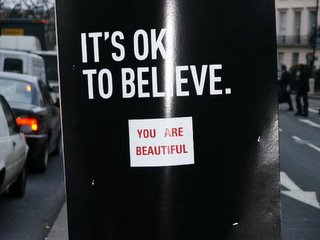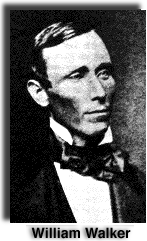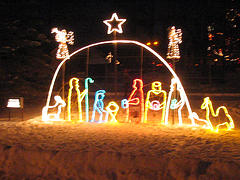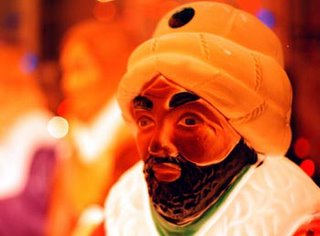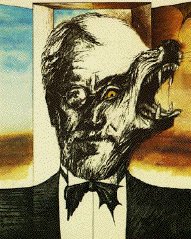
Socrates says in Plato's Apology: "The unexamined life is not worth living." But is the examined life worth living if one does little else? Below we'll look briefly at two 'outsiders' who examine life and who perhaps come to some conclusions of worth. More importantly, we'll look at those who are insiders on the outs, and we'll see what it means in terms of today's world and our collective future, the future of our modern revolutions, and our lives as revolutionaries.
Many years ago Colin Wilson made a splash writing a book called The Outsider, an unbearably post-adolescent book today, but one then that made the middle classes take notice of the banality of life unexamined by showing the lives of artists and thinkers who worked outside the mainstream of public opinion. Many of those writers and thinkers are today highly valued by our societies. In their times they were generally not highly valued. They were outsiders. We'll look at a couple of short reviews of Wilson's book to get an idea of what he wrote about.
Following Wilson we'll look at another book, translated from the French title L'Etranger, into The Outsider, a person estranged from society and himself, it seems. Or is it not so? Perhaps it's the rest of the world out of sorts. Camus won a Nobel Prize for literature writing this kind of thing.
Finally, our looking at those who write about outsiders brings us to those like our fellow blogger, a west Texan named Papa Ray. On the face of it, Papa Ray is not what one would call an outsider. He doesn't seem to live in a garret, doesn't murder old pawn broker ladies and their nieces with an axe, doesn't repeatedly shoot Arab men for no reason, isn't mooning about reciting poetry. No, Papa Ray seems to be a pretty solid middle class American who worked all of his life after a couple of tours in the army during the Viet Nam War, and now, retired, dotes on his grandchildren. It is our argument here that Papa Ray and those like him are outsiders, not part of the mainstream of Western culture. I tend to think something is wrong when men and women like Papa Ray and his compatriots are outsiders.
****
does not unerstand what he is saying, April 27, 2005
| Reviewer: | oinker boinker "anti sellout" (USA) - See all my reviews |
he also thinks he has a right to say what is indifferent in scociety and what isn't. the truth of the matter is that the reason someone is an outsider is that the magority of people think the minority is strange. and it makes the magority mad at the minority because the minority doesn't or likes that the magority is mad at them.
so unless you want a good laugh dont by this assuption built upon assumption.
****
****
FIRST published in 1942 and translated into English in 1946, The Outsider (or The Stranger, as it is known in the less felicitous American translation) was a huge success and made a celebrity of its young and previously little known author.
The Outsider is a fictional dramatisation of Camus' developing theory of the absurd, the idea that because human existence lacks any ontological (God given) order, and because it ends inevitably in death, it is inherently absurd. But if that absurdity is actively accepted and even embraced, the here and now takes on a new richness and sense of possibility. Meursault discovers not long before his execution that he has been intensely happy.
[....]
What Camus wants to create is a person whose entire existence lies in the present and in the physical. Meursault enjoys swimming, sex, smoking; he evokes sensuous pleasures - ``warm smells of summer, my favourite streets, the sky at evening, Marie's dresses and her laugh''. He is entirely unanalytical, immersed in the immediacy of the moment, and Camus wishes us to see in him a certain kind of innocence, even integrity that the rest of the world finds intolerable.
Camus has written that, ``In our society, any man who doesn't cry at his mother's funeral is liable to be condemned to death'', and also, of Meursault, ``Far from it being true that he lacks all sensibility, a deep tenacious passion animates him, a passion for the absolute and for truth.'' On this reading, he is a kind of hero whose rejection of hypocrisy, contempt for the pieties of religion, and insistence on following his own instincts, make him ``the only Christ we deserve'', according to his creator. This was how he was widely regarded when the book first appeared.
[....]
This passivity, this inability to make any sort of moral choice, seems harmless enough until we realise that life cannot be lived without the exercise of one's will; it simply becomes impossible. When Meursault tells his girlfriend he is willing to marry her but would marry anyone else in a similar situation, it is comic.
[....]
But the actual substance of Meursault's speech is not much more than that death renders all human life unimportant, and his final wish strikes a note of inappropriate bravado: ``For all to be accomplished, for me to feel less lonely, all that remained was to hope that on the day of my execution there should be a huge crowd of spectators and that they should greet me with howls of execration.''
Like most of Camus' fiction, The Outsider suffers from the weight imposed on it of Camus' philosophical speculations. But it remains a fascinating book, written in superbly lucid prose and capable of endless reinterpretation.
http://www.education.theage
Ray writes:
Retired, raised poor, enlisted in US Army at 18, two tours in Nam, worked for IBM for 29.5 years. knees shot, get to park in handicapped spaces. Worried now about the future for my Grandchildren. My Special Grand Child, Sarah Ann, the light of my life and reason for living. I also have three Grandsons, I worry that they will have to go and fight to destroy the forces in the world that would harm America and others just because they hate everyone who is not a "true believer" of Islam.
****
One thing Papa Ray and I share today is space outside the mainstream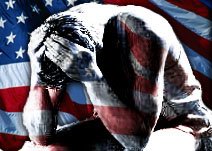 of Western thought and public opinion. Why is the West so dysfunctional that men like Papa Ray are outsiders?
of Western thought and public opinion. Why is the West so dysfunctional that men like Papa Ray are outsiders?
Neil Postman writes of technology and information and education. He writes about Socrates. He writes about values. In a sense he writes about men like Ray. All the information on Earth isn't going to improve a man who loves his kids and grandchildren. It won't make him a better man if he has more and faster information from the Internet. Nor will it make the average dhimmi idiot a better person. If we don't have some basic values of worth to start with, more information isn't going to do us any good, not matter how much faster we can get it. When a man like Papa Ray is an outsider, then I question the worth of our society, and I find it wanting. When the mainstream is so polluted with filth and hatred and evil, and can't even bring themselves to listen to those terms without sneering at our unsophistication, then there is something very wrong with our mainstream. When a man like Ray is an outsider, then what kind of society do we have?
I look forward to this new year. I think there will be an increasing number of normal and decent people in the West who find themselves cast out of the mainstream, and I think they'll find themselves in the vast and growing majority, a majority with the power to say they've had enough of Left dhimmi fascism, enough of Presbyterian dhimmi pandering to Islamic murderers, enough shit poured down from on high, from out so-called mainstream; and I hope to be here next year to wish you all a happy New Year again, in a better world than ours is today.
We all here at the fortress wish you a Happy New Year!










